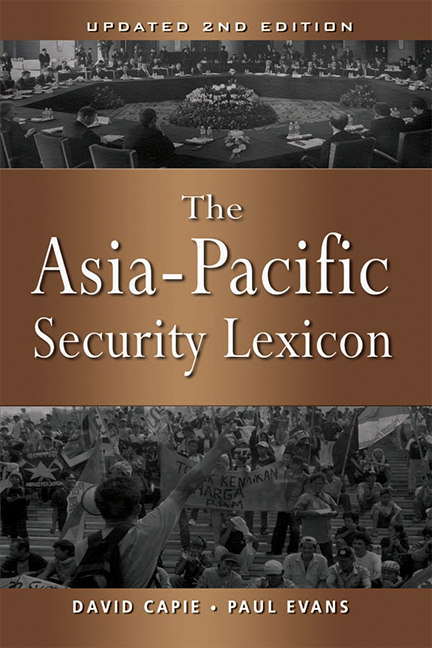Book contents
- Frontmatter
- Contents
- Abbreviations
- Introduction to the Second Edition
- Ad Hoc Multilateralism
- A la Carte Multilateralism
- The “ASEAN Way”
- Balance of Power
- Bilateralism
- Coalition of the Willing
- Coercive Diplomacy
- Collective Defence
- Collective Security
- Common Security
- Comprehensive Security
- Concert of Powers
- Concerted Unilateralism
- Confidence-Building Measures
- Confidence- and Security-Building Measures
- Constructive Intervention
- Cooperative Security
- Engagement
- Flexible Consensus
- Human Security
- Humanitarian Intervention
- Middle Power
- Multilateralism
- Mutual Security
- New Security Approach
- Non-Traditional Security
- Open Regionalism
- Peaceful Rise
- Pre-emption and Preventive War
- Preventive Diplomacy
- Security Community
- Terrorism
- Track One
- Track One-and-a-Half
- Track Two
- Track Three
- Transparency
- Trust-Building Measures
- About the Authors
Non-Traditional Security
Published online by Cambridge University Press: 21 October 2015
- Frontmatter
- Contents
- Abbreviations
- Introduction to the Second Edition
- Ad Hoc Multilateralism
- A la Carte Multilateralism
- The “ASEAN Way”
- Balance of Power
- Bilateralism
- Coalition of the Willing
- Coercive Diplomacy
- Collective Defence
- Collective Security
- Common Security
- Comprehensive Security
- Concert of Powers
- Concerted Unilateralism
- Confidence-Building Measures
- Confidence- and Security-Building Measures
- Constructive Intervention
- Cooperative Security
- Engagement
- Flexible Consensus
- Human Security
- Humanitarian Intervention
- Middle Power
- Multilateralism
- Mutual Security
- New Security Approach
- Non-Traditional Security
- Open Regionalism
- Peaceful Rise
- Pre-emption and Preventive War
- Preventive Diplomacy
- Security Community
- Terrorism
- Track One
- Track One-and-a-Half
- Track Two
- Track Three
- Transparency
- Trust-Building Measures
- About the Authors
Summary
Similar to the concepts of comprehensive security, cooperative security and human security, non-traditional security emphasizes threats to security of states and individuals that extend beyond “traditional” military threats to the territorial integrity of the state. As with the broader concept of human security, there is a very long list of what these threats to security can be.
In the mid-1990s, several writers in Europe and North America used the term non-traditional security in an effort to widen the scope of security studies and alert governments and publics to new and emerging threats to states and peoples. The fact that the very term designates what something is not rather than what it is has posed special analytical problems for academics trying to employ it.
In Asia, “non-traditional security” has been used by ASEAN and several regional governments. The state most active in developing and promoting it has been China. China's “new security concept” [see the relevant entry] did not use the phrase in its formulation in 1997 and 1998 but did lay the foundation for its explicit use later in the context of the Shanghai Cooperation Organization. In May 2002, China issued a position paper on cooperation in the field of Non-Traditional Security, identifying seven areas that deserved attention and emphasizing prevention and respect for sovereignty and non-interference and the principles of mutual trust, mutual benefit, equality and coordination. According to Zhang Yunling, “the concept of ‘security’ is traditionally relevant only to states and the security threats to states are mostly external and military in nature.” In contrast, “non-traditional security covers broader areas, ranging from the political, economic and social to the ecological, environmental and cultural issues.” In addition, “while traditional security threats come from [outside] the state, non-traditional security comes from both within and [outside] the state (mostly from within).”
- Type
- Chapter
- Information
- The Asia-Pacific Security Lexicon (Upated 2nd Edition) , pp. 173 - 178Publisher: ISEAS–Yusof Ishak InstitutePrint publication year: 2007

